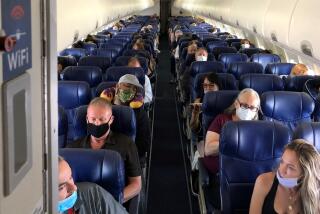Proposal to Ban Electronic Devices on Flights Rejected
- Share via
ARLINGTON, Va. — Transportation Secretary Samuel K. Skinner today rejected proposals to protect airliners against terrorist bombings by banning laptop computers, cassette recorders and other electronic equipment from U.S. flights.
Instead, Skinner said the Federal Aviation Administration will require intensive screening for those devices on U.S. flights originating in Europe and the Middle East.
The bombing of Pan Am Flight 103 over Lockerbie, Scotland, last December prompted a call to ban all such equipment, whether checked in or carried aboard. Investigators found a plastic explosive concealed in a radio-cassette recorder among the wreckage of the flight that killed 270 people.
Skinner said in a luncheon speech that the FAA ruling will “provide an increased level of safety and security but, at the same time, will not penalize passengers who have a legitimate need to carry or use these articles.”
Skinner indicated that the decision was made to avoid an overreaction that might “further the terrorists’ objective of disrupting the world’s air transportation system.”
“It is my firm belief that the option we have selected provides the proper balance between passenger safety and convenience at this time,” he said.
The intensive screening will not apply to U.S. domestic flights or to flights originating from countries outside the Middle East or Europe.
The FAA said the new requirements will include a careful screening of all passengers transporting electronic equipment.
Items such as radios, tape players and laptop computers would be subjected to progressively greater scrutiny until they were cleared, the FAA said.
The FAA said in a news release that additional time may be required at airport screening points as a result.
“If electronic devices are not needed on a particular trip, passengers should consider leaving them behind,” the FAA said.
More to Read
Sign up for Essential California
The most important California stories and recommendations in your inbox every morning.
You may occasionally receive promotional content from the Los Angeles Times.













